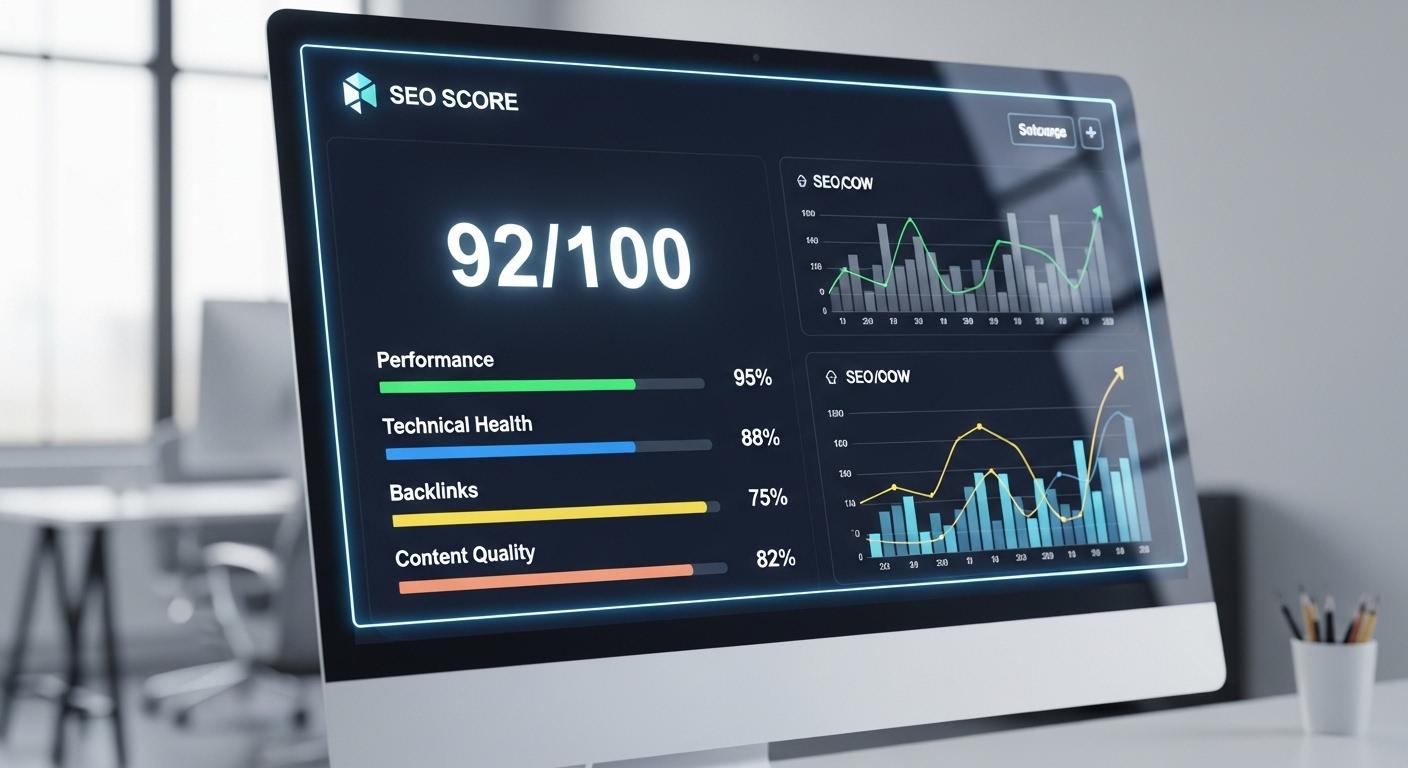
Many website owners wonder why their pages don't rank well on Google, even when they publish content regularly. Some believe they need more keywords, others think they need more links, and some assume Google ignores smaller sites. While this confusion is common, the real starting point is simple: you need to understand your SEO score and what its meaning is. This score reflects how well your site follows search engine standards.
When people ask, "what is an SEO score?" they usually expect a complex answer. In reality, the concept is easier to understand than it seems. The score is a number that shows how well your site aligns with ranking factors, including content quality, site structure, technical health, user behavior, and authority. The score helps you see where you stand, identify your next steps, and understand what needs improvement.
Understanding what an SEO score is gives you a clear view of your site's condition. If your score is high, your chances of ranking improve significantly. If it's low, you risk losing visibility and traffic. Your SEO site score helps measure your ability to attract users and convert them into leads or customers. Sites with strong optimization typically perform better in organic search because Google rewards quality and relevance.
This guide explains how scores work, why they matter, and how you can increase yours over time. You'll learn how tools calculate ratings, how to interpret SEO score metrics from Google and other platforms, and how each component affects your growth.
What Does an SEO Score Mean and Why It Matters
Business owners often ask for a definition of an SEO score and want to understand how it affects their ranking potential. The score indicates how well your website follows core optimization standards, with most tools using a 0-100 scale. A score closer to 100 indicates strong optimization, while a low score reveals issues that limit visibility, traffic, and conversions.
When you search "what is an SEO score," most explanations focus on this simple idea: it's a reflection of your website's health. A high score means your pages follow search guidelines — your site loads quickly, works well on mobile devices, uses clear content, and includes links to credible sources. A low score indicates issues that block growth and need attention.
Generally, a good score ranges from 80 to 100, average scores fall between 50 and 79, and anything below 50 usually signals serious problems requiring immediate attention. Higher scores tend to correlate with better search results positions because they reflect websites built with users in mind.
Marketers use these scores for planning and improvement, companies use them to evaluate site performance, and content teams use them to refine pages. In every case, the score shows what to focus on and helps measure the impact of your improvements.
How Google and Other Tools Calculate Your SEO Site Score
Many owners want to know how SEO site score metrics are calculated and why different tools sometimes give different results. The calculation depends on several core areas, with each tool using its own weighting system, though the categories remain similar across platforms.
Tools examine on-page factors like titles, headings, meta descriptions, keyword targeting, readability, and internal links. They also evaluate technical health, including load speed, mobile usability, HTTPS implementation, server errors, and crawlability. Backlinks influence your rating as well — a site with trustworthy links typically receives a higher score. Mobile performance matters significantly because Google prioritizes mobile-first indexing.
The phrase "SEO score Google" confuses many people because Google doesn't publish one official score. However, Google does evaluate similar signals — speed, mobile quality, security, structured data, and relevance all play major roles. The difference is straightforward: third-party tools translate these signals into one clean number you can track.
Popular tools that offer score SEO metrics include:
- Semrush
- Ahrefs
- Moz
- Sitechecker
- Screaming Frog (for deeper technical audits)
These platforms calculate your SEO score by combining several ranking factors into a single comprehensive score, helping you understand how well your site aligns with real-world search expectations.
Key Factors That Affect Your SEO Score

Many readers want to know which specific elements influence their SEO scores and why some pages perform better than others. Several key areas shape your total rating — when you improve these areas, your score rises; when they weaken, your score drops. These elements form the foundation of all optimization work:
- On-page optimization includes titles, content quality, keyword targeting, internal structure, and helpful formatting. Both search engines and users need clarity, so strong pages answer user questions with detail and accuracy.
- Technical performance is another major factor. Speed, mobile usability, secure connections, and clean URLs create better user experiences. When your site loads quickly and functions well on mobile devices, your score reflects this positively. Slow loading times or multiple errors will decrease your score.
- Backlinks also significantly influence SEO scores. Links from authoritative domains signal trust, with Google viewing them as proof that other sites value your content. Without quality links, ranking becomes more difficult because your site holds less authority.
- User engagement also affects your rating. When users stay on your site longer and view multiple pages, your score often increases. Quick exits may cause your score to drop, as engagement signals help demonstrate relevance.
All these components are interconnected. When you systematically improve each factor, your results improve. When people ask, "What is an SEO score?" The real answer is: it's a comprehensive summary of these combined areas.
Common Mistakes That Lower Your SEO Score
Many owners harm their performance without realizing it by making simple mistakes that reduce their rating. These issues weaken your SEO scoring metrics and make growth more difficult, but fixing them increases visibility and user trust.
- Keyword stuffing remains a common mistake. When sites repeat the same phrase too often, content quality drops and signals poor writing to search engines. Balanced keyword use improves clarity and readability.
- Broken links also lower your rating. When visitors click links that lead nowhere, trust erodes. Tools penalize this issue because it weakens user experience, but fixing broken links is straightforward and brings quick improvement.
- Duplicate content can significantly reduce your score. Search engines prefer unique content, and duplicate pages weaken relevance and confuse ranking signals. Resolve duplicates by rewriting or using proper redirects.
- Poor mobile usability significantly hurts your score. Since users now rely on phones more than desktops, a site that displays poorly on mobile will struggle to rank. Fixing layout problems, font issues, or slow load times can quickly raise your score.
- Weak internal linking harms site structure. When pages don't connect logically, both users and search engines struggle to navigate your site. A clear internal linking system helps distribute authority and improve overall understanding.
How to Improve Your SEO Score Step by Step
Improving your rating takes consistent work — you can't fix everything at once, but you can follow a clear process. Each step builds momentum toward better performance:
- Start with a comprehensive site audit. Use a tool that analyzes structure, content, speed, links, and overall performance. This audit reveals your weakest areas and provides direction for your next actions, offering a clear breakdown of your SEO score definition so you understand how each element contributes to your total rating.
- Fix technical issues next by resolving broken links, improving page speed, addressing mobile problems, fixing indexing errors, and implementing HTTPS throughout your site. These changes often provide the fastest gains.
- Improve content for target keywords by writing pages that answer real user questions, using headings that create a clear structure, and adding internal links that help readers navigate your site. High-quality, relevant content directly supports your rating.
- Build strong backlinks by earning links through genuinely useful content, engaging with reputable websites, offering valuable insights, and providing real value to your industry. Quality links raise authority and improve your overall score.
- Track progress monthly by monitoring increases and declines, and adjust your strategy as needed. Improving your score takes time, but consistent effort enhances both conversions and visibility, leading to steady results.
Tracking and Maintaining a High SEO Score Over Time
A high score requires ongoing effort. Once you improve your site, you must monitor for new issues because search engines update their systems regularly, user needs evolve, and content ages. A site that performs well today may fall behind tomorrow without proper maintenance.
Monitor your score weekly or monthly by reviewing metrics, looking for new errors, and fixing problems early. Regular reviews protect your hard work and prevent major drops, helping you stay ahead as your rating shifts for various reasons.
Update your content regularly by adding new pages when needed, refreshing old pages with current details, and removing outdated information. High-quality sites grow over time, which helps you maintain a solid rating and stronger visibility.
Monitor your backlink profile by removing harmful links and building new ones as your business expands. Authority significantly affects both ranking and score.A strong rating supports better overall performance in Google's ranking system. Higher quality improves user experience, leading to stronger engagement and more conversions. When people ask "what is an SEO score," the simplest answer is this: it shows how well your site supports long-term visibility. By maintaining your score, you support your business growth and expand your reach effectively.
learn with mettevo
view blog


Are You Ready To Grow Your Website?
Understanding the ins and outs of website growth, we help ensure that your site grows over time with ever-increasing reach and accessibility. Not only do we employ the latest digital marketing techniques for driving traffic directly to your website, but our strategies also focus on gaining loyalty from those visitors so they come back again and again.
Leave your contacts to get a comprehensive and aggressive digital marketing plan taking your business to new heights.